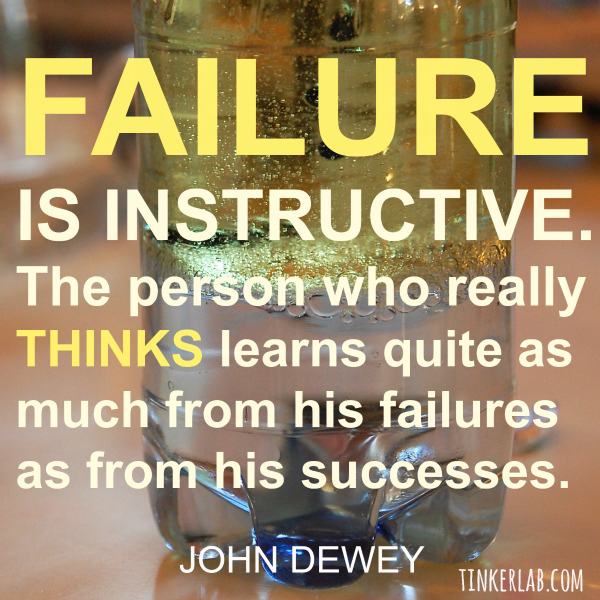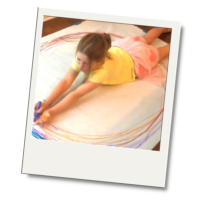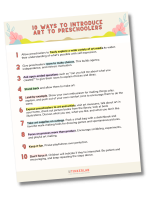I’ve been thinking a lot about failure lately, and how failure is nothing more than an opportunity to learn, improve, iterate, and grow.
Innovators aren’t afraid of failure, and in many cases it’s only by embracing failure that we can learn to pick ourselves up and get closer to the outcome that we envisioned in the first place.
What do you think about failure? Are you a perfectionist? How do you react when things don’t go as you planned?
What do you think stands in the way of your ability to fail, or why do you think you’re good at accepting mistakes as part of the learning process?
More on Failure and Innovation
The term “loser” hasn’t been around forever, and in the mid 19th century, Americans began to associate business failures with personal failure. Read more about this fascinating history of the beginnings of failure in America, Born Losers: A History of Failure in America
Creating an Innovation Culture: Accepting Failure is Necessary, Edward D. Hess, Professor of Business Administration and Batten Executive-in-Residence at the Darden Graduate School of Business for Forbes.
Why Great Innovators Fail: It’s all in the Ecosystem, Forbes
Don’t Fear Failure in Innovation: Google’s Chief Technology Advocate, CIO.in
Why Failure Drives Innovation, Baba Shiv, Sanwa Bank, Ltd. Professor of Marketing at the Stanford Graduate School of Business
guts recension här





My mother and I talked about this in reference to the Tiger Mother book. She felt it was important for kids to experience failure and grow from that experience. I felt that failure needed to be less stigmatized.
Hi Smallgood,
Failures can be painful when we’re in the middle of them, but they’re always full of life lessons that offer us opportunities for growth. Your mom sounds like she knows what she’s talking about. Failures do need to be less stigmatized — if we can reframe them as learning moments or see them as part of the natural flow of life, it’ll make it easier for us to pick ourselves up and move forward with more confidence.
Take care,
Rachelle
When I was younger I wished I could have not gone through or experienced failures with a better outcome, but as I got older I realized I may not be the person I am today, or know any better if I hadn’t, and I like who I am. I wouldn’t trade those lessons in disguise at all.
Hi Heather,
I know, when we’re in the midst of a failure it can feel endless and irrevocable. I love hearing that your failures have molded who you are today, and that you’re a better person for it.
Fondly,
Rachelle
This is such a hard thing for me to remember, even when it comes to Little A. When failures happen, I feel crushed. I am doing a better job at reminding myself that with every failure, I’m learning how to do something better. I fight this unrealistic idea that I must do everything perfectly right away, no learning required. Oof, that sounds so silly.
Hi Jess,
Just the word “failure” implies that we’re horrible, ignorant, or stupid. What a shame, and no wonder so many of us dwell on them as setbacks rather than growth opportunities. Keep up the hard work of facing your “failures” head-on, and LIttle A will take note!
Take care,
Rachelle
Love this and it is a great reminder. Every day I feel like I fail at things, but this is how I grow as a person. I’ve actually started to even laugh at myself because failure is just part of life. How would a baby ever learn to do anything? As an adult we need to be reminded that failure is just a given to live a creative life. Older kids need to know this too, but also to realize “failing a class or test”on purpose is not the same thing. (or is it?)
Hi Melissa,
I know what you mean about laughing at ourselves. It does make accepting the failure much easier. If we can all keep that “baby learning to walk” example in our minds as we make mistakes, we’ll be better for it. As for failing a test, well, I’d say that’s another lesson in hard work and perseverance rather than flat-out failure despite trying. But maybe it’s also a child’s way of saying that they’re not interested in learning the content, or that there could be a better way to learn. Thanks for making me think.
Rachelle
The other day I was watching my kids (7 and 5) play with dominoes. They were standing them up and knocking them down over and over. It was instant results. If they made a mistake it was easily corrected and tested again. What a wonderful way to practice using failure to move forward. Perfect timing for this post. 😉
Hi Jill,
I’m so glad you shared this play scenario with us. I was speaking with a friend the other day about how she can help her child move away from perfectionism, and activities could help her move in the right direction. The stakes are low, but the opportunity to practice and learn are high. And thanks for sharing your photo with me — attaching it here!
xo,
Rachelle
This is such a great topic, Rachelle. I think that failure and mistakes are so natural to human beings and to the learning process. But, how did it happen that it became so unnatural, and that we feel bad about ourselves if we make a mistake or fail. How come we became a civilisation in which it is a must to be perfect, to know everything in advance, as if we were born with all the knowledge. What is then left for us to learn or improve, or achieve, or wonder, or be better… This imperative of perfection prevents learning itself and the process as well. I often think about the process of learning to ski or ride a bicycle. One just has to fail and make a lot of mistakes in order to learn these skills. Those who are not ready to make mistakes and fail, usually never learn things in the end.
Hi Make and Play!
I love your question: How did it happen that it (failure) became so unnatural? It makes me wonder if there was a time that our society embraced failure as part of life. Of course we’re not born with knowledge, and life is about learning and growing, so it’s a real wonder as to when this happened. So I did a little digging and came across this book: “Born Losers: A History of Failure in America.” It sounds like until the mid-19th century, the word “loser” defined an event (such as losing money on a house) rather than a person. But around this time, people began associating their business success with personal worth. Fascinating! I’ll add a link to it in this post in case anyone wants to read more.
Fondly,
Rachelle
[…] with outtakes from all our misses (the balloon is a good example of that). But this is great news! Failure is an intrinsic piece of the invention process, and without these mistakes we won’t learn how things really work. So embrace failure and […]